Austria Kurz: Why young favourite could turn to Greens
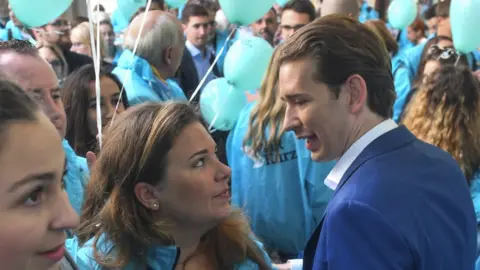 EPA
EPAAustrians vote in an early general election on Sunday after a video sting scandal that led to the collapse of the coalition between the conservatives, led by Sebastian Kurz, and the far-right Freedom Party.
The polls suggest Mr Kurz is on track to win first place with around 34%. He will then have a choice either to look again to the far-right or this time turn left, most likely to the Greens, for a new coalition.
The 33-year-old leader who turned around the fortunes of the People's Party seems to have emerged unscathed from the "Ibizagate" scandal.
"Sebastian Kurz did the right things for young people, tacking migration and government debt," Vienna student Julian told me. "I hope he will continue his good work for Austria."
Will Kurz resume 'marriage' with far right?
The scandal toppled Mr Kurz's government and the former leader of the far-right Freedom Party, Heinz-Christian Strache,
Mr Strache was caught on video promising government contracts to a woman posing as the niece of a Russian oligarch.
He resigned and the Freedom Party, under new leader Norbert Hofer is hoping to renew the coalition with Mr Kurz.
At a campaign barbecue in a wine tavern in Horitschon, in his home province of Burgenland, Norbert Hofer told me the previous government had been "very good".
"It's like a marriage. Something can happen, of course, when you are together, but I think it is possible to build up this coalition again."
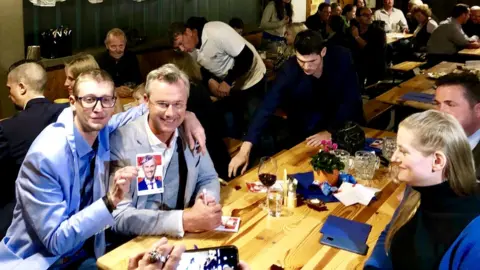
A Freedom Party campaign video shows Norbert Hofer, fondly straightening a portrait of Sebastian Kurz, which has tilted to the left.
"Vote Freedom Party," he says, "if you want our very popular collaboration with the conservatives to continue", preventing "mass migration, Islamisation, multi-culturalism, and CO2 taxes".
What are the options?
But while Mr Kurz shares a tough anti-migrant line with the Freedom Party, political analyst Thomas Hofer says another coalition with the far-right is by no means certain. He says it could be politically risky for Mr Kurz, who has already presided over the collapse of two governments, in 2017 and 2019.
"If he continues with the Freedom Party, it might be easy in terms of content, but there is a lot of instability in the Freedom Party right now. Mr Kurz has to have five years of continuous government now."
Allow X content?

A grand coalition with the Social Democrats is considered unlikely because of the bad relations between Mr Kurz and the centre-left leadership.
Another option for Mr Kurz would be a three-way pact with the Greens and the liberal Neos - a first in Austria.
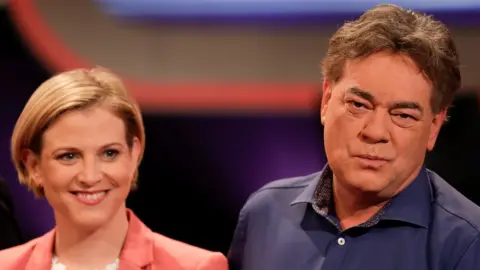 Reuters
ReutersBut that depends on the Greens making a sizeable comeback after failing to make it into parliament in the last election in 2017. The Greens are currently polling at around 13%.
The lure of the Greens
As she handed out pamphlets outside an underground station in Vienna, Green candidate Sibylle Hamann said the climate issue had reached the mainstream in Austria. But she refused to be drawn on the question of a coalition with Mr Kurz.
"Climate is the most important subject for us now, but we won't talk about coalitions before election day. We're not ruling out anything," she said.
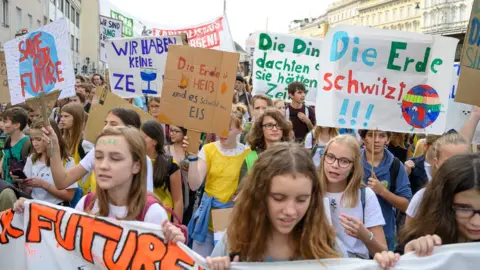 AFP
AFPA pact with Mr Kurz's conservatives might not sit well with left-wing Greens voters like Philippa, who are attracted to their policies on social equality as well as climate change.
Mr Kurz is also keeping his cards close to his chest when it comes to possible future coalition partners.
At a rally in Vienna, cheered on by supporters holding bunches of turquoise balloons, he warned against a left-wing coalition led by the head of the Social Democrats, Pamela Rendi-Wagner.
He urged his supporters not to rely on opinion polls. "Anyone who wants us to continue our course, has to vote for us," he said.
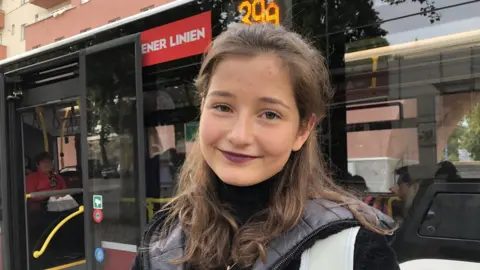
Thomas Hofer says Mr Kurz faces a difficult choice when it comes to a future government alliance. "It's like choosing between the plague, cholera and Ebola, simply because there is no real option where he can be sure that his image won't be damaged in any way."
Some Austrians, like Miriam, a teacher in Vienna, don't want Mr Kurz in power at all.
"I think he has taken the country in a really wrong direction because he allowed the Freedom Party to become part of the government and so the entire country has had a time of right-wing policies and you can really feel that in society. So I think he is really not a good politician."

Who's who in Austria's election?
Sebastian Kurz, Austrian People's Party (ÖVP)
The son of a secretary and a teacher, he became active in the ÖVP at the age of 16. As a law student in Vienna he was elected chairman of the People's Party youth wing. He quit his studies in 2011 to become a junior interior minister, rising to foreign minister in 2013 at the age of 27.
Two years later he presented a 50-point plan to improve the integration of immigrants. However, he was full of praise for Hungary's populist Prime Minister Viktor Orban, and claimed credit for closing the Balkan migrant route in 2016.
Elected chairman in May 2017, he rebranded the party as the Turquoise Movement then served as chancellor from December 2017 to May 2019, when the Ibizagate brought down the coalition.
Pamela Rendi-Wagner, Austrian Social Democrat (SPÖ)
Opinion polls put the centre-left SPÖ second behind Mr Kurz's People's Party and their leader has declared herself open to talks with any party except the far right.
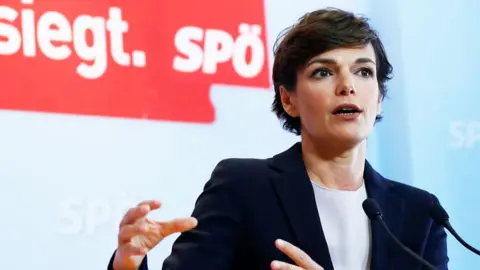 Reuters
ReutersIt was Ms Rendi-Wagner who initiated the successful vote of no confidence in the Kurz cabinet in the wake of the video scandal. She has won support for seeking to integrate immigrants and espousing environment-friendly policies.
Brought up in a Vienna council flat by her single-parent mother, she studied medicine before joining the health ministry as a civil servant. She worked closely with Health Minister Sabine Oberhauser, who died from cancer. When she took over as minister her political career began and she became party chairman in November 2018.
Norbert Hofer, Austrian Freedom Party (FPÖ)
The far-right party's ads call him "Our Norbert" and this former aeronautical engineer has only been leader since mid-September.
Despite the scandal that brought down ex-leader and Vice-Chancellor Heinz-Christian Strache, the far-right FPÖ has rebounded with the broader appeal of the new man at the helm.
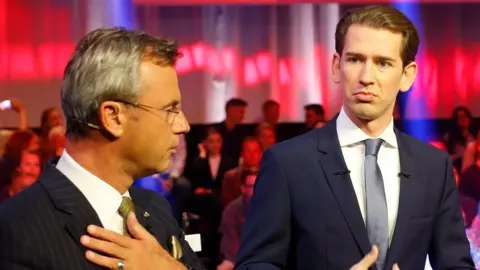 Reuters
ReutersFor 11 years he was a provincial party secretary and became a close adviser to Mr Strache before being narrowly beaten in the 2016 presidential election run-off.
Mr Hofer, 48, is a gun enthusiast who walks with a trademark stick after a paragliding accident in 2003.
Werner Kogler, Austrian Greens
"Who would the future elect?" is his campaign slogan and climate change has become a top voter concern. Mr Kogler, 57, hopes to reverse shock losses from the last election when the Greens failed to gain the 4% needed to sit in parliament.
Mr Kogler's party is a potential coalition partner for the ÖVP but he will insist on a public investment package in environmental measures.
A founder member of party forerunner Alternative List, he was elected as Greens MP in 1999 and became leader after the party's dismal election performance in October 2017 .
He has a strong accent from his native Styria in the south-east and his signature green sunglasses have become a hallmark feature on the campaign trail.
Profiles by BBC Monitoring, which reports and analyses news around the world. You can follow BBC Monitoring on Twitter and Facebook.
